Cao Cao, styled Mengde, was a native of Peiguo in Qiao county. He was the founder of the state of Wei and a famed politician, military leader and scholar. He was one of the representative poets of the Jian’an era. In the last years of the Han dynasty, massive rebellions, famine and civil strife made the demise of the Empire seemed certain. Cao Cao chose to adopt measures to prevent the consolidation of land into the hands of the few great houses, but instead establishes a system of conscript farming. He also used people regardless of their background, being able to gather some of the finest military leaders and administrators in the land. With his outstanding military skills, he managed to unite the Central Plains and take possession of the Han Emperor, with which he was able to defeat Yuan Shao and dominate much of the nation. For a time he seemed unstoppable and destined to unite the empire, however his infamous defeats at Chibi in 208 CE and Hanzhong in 219 CE would shatter his ambition, as both Liu Bei and Sun Quan were able to establish powerful rival realms. In 213 CE he was given the title Duke of Wei, then in 216 CE he was made King of Wei. Despite being pushed by several members of his administration to do so, he did not seek to usurp the Emperor and establish himself as Emperor of Wei. He died in Luoyang in 220 CE at the age of 65. In less than a year his successor, Cao Pi, deposed Emperor Xian declared himself Emperor of Wei, with Cao Cao being given the posthumous title of Emperor Wu of Wei.
| OFFICERS & SUBORDINATES | | CAO ANG | | Cao Ang, styled Zixiu, was a native of Peiguo in Qiao county. He was the eldest son of Cao Cao and Lady Liu, although Lady Liu died when Ang was young and he was mothered by Lady Ding, who treated him as her own son. At the age of 19 he was recommended for xiaolian, or Incorrupt and Filial Piety, which was a highly respected civil service appointment. He followed his father on campaign to Jing province, first coming to Zhang Xiu's city of Wancheng. Zhang Xiu surrendered to Cao Cao, but became enraged when Cao Cao tried to seduce his aunt Lady Zou, the wife of his late uncle Zhang Ji. Zhang Xiu attacked Cao Cao's unprepared forces at Wancheng and overran his encampment. Cao Cao was wounded by an arrow in his arm and his steed was taken from underneath him, so Cao Ang offered his horse to his father to escape the battle. Cao Ang stayed behind and fought Zhang Xiu's men, but was eventually killed. He was only 20 years old. After Cao Pi ascended as Emperor Wen of Wei, Cao Ang was given the posthumous title of Prince Fengdao and later changed to Prince Fengmin by Cao Pi's successor Cao Rui, Emperor Ming of Wei. |
| CAO CHUN | | Cao Chun, styled Zihe, was a native of Peiguo in Qiao county. He was the younger brother of Cao Ren and followed Cao Cao in his numerous campaigns. Cao Chun served as an Advisory in the campaigns of the Chief of Crafts and was in charge of the elite Tiger Leopard Cavalry, killing Yuan Tan at the battle of Nanpi and capturing the Chanyu Ta’dun in the campaigns against the Wuwan. He henceforth achieved a great many deeds. He followed Cao Cao in his southern campaigns and pursued Liu Bei in the battle of Changban. After the battle of Chibi he returned to Qiao county where he died a few years later. |
| CAO HONG | | Cao Hong, styled Zilian, was a native of Peiguo in Qiao county. He was the younger cousin of Cao Cao and was a man of great temerity and fierce loyalty, and was willing to sacrifice himself. When Cao Cao rallied his troops against Dong Zhuo, he was defeated by Xu Rong. In the rout that followed Cao Cao lost his horse. Cao Hong gave up his horse for Cao Cao and yet Cao Cao refused to ride it. Cao Hong thus said: “The world can do without me, but it cannot do without you.” And with this he proceeded to escape on foot. Later Cao Hong would follow Cao Cao in his numerous campaigns. Cao Cao trusted him and often appointed him as the vanguard. Cao Hong had rescued Cao Cao on more than one occasion, and once he was pardoned despite committing an offense that should have executed him. He was made General of the Cavalry, and given the posthumous title of the Honored Duke after his death. |
| CAO REN | | Cao Ren, styled Zixiao, was a native of Peiguo in Qiao county. He was a famed general of Wei in the Three Kingdoms era. Cao Ren enjoyed horse archery and was wild in his youth. However, when he grew older and became a general, he became immensely strict and followed orders to the letter. He followed Cao Cao for many years and achieved numerous valors. In the battle of Guan Du, Cao Ren surrounded Gao Gan in the Hu Pass. Cao Cao had announced that he would execute all the defenders once the pass was taken, resulting in a difficult siege that lasted months with no success in sight. Cao Ren thus provided an adage that “when surrounding a fortress one should leave an opening”. Cao Cao listened to this advice and the pass surrendered. For this and other previous deeds Cao Ren was made Marquis of Du Ting. Cao Cao would rely on Cao Ren as his southern bulwark and grant him the title of General that Conquers the South. In this defense of Jing province, Cao Ren once checked the Wu general Zhou Yu’s advance at Nanjun, and also repelled Guan Yu at Fan Cheng. He also served as General that Pacifies the West in a campaign against Ma Chao. In the reign of Emperor Wen, Cao Ren was made General of the Chariots and was in charge of the military affairs of Jing, Yang, and Yi provinces, and granted the title Marquis of Chen. He also attacked Chen Shao with Xu Huang and entered Xiangyang. For this he was made the Grand Marshal. Later Cao Ren garrisoned at Lin Ying in obeisance of imperial edict. He was made into the General of the Agile Cavalry and was in charge of the garrisons at Wu river, carrying out conscript farming at Hefei. He died in the fourth year of Huangchu at the age of 56, and was given the posthumous title Duke of Loyalty. |
| CAO XIU | | Cao Xiu, styled Wenlie, was a clansmen of Cao Cao, and was treated like a son by the latter. Cao Xiu often followed Cao Cao in his campaigns and served as Captain of the elite Hubao cavalry or Imperial Security. Liu Bei sent Wu Lan to garrison Xiabian. Cao Xiu followed Cao Hong in the campaign against Wu Lan. Cao Xiu was the military adjutant by title, but in reality he was more of the Chief Comamnder of the campaign. The Wei army defeated the Shu following his suggestions. In the reign of Emperor Wen, Cao Xiu was promoted to be the General of the Imperial Guards and served later as General who Subdues the South. He succeeded Xiahou Dun in his garrisoning of the east front of Wei and fought against Wu on numerous occasions, defeating the Wu general Lu Fan at Dongpu. For this he was promoted to Marshal who Conquers the East, and Great Chief of the Cavalry. He was constantly in charge of the military of Yang province. Cao Xiu was later lured into a campaign deep into Wu following the suggestions of the Wu general Zhou Fang, who pretended to surrender. However, he was dealt a great defeat by Lu Xun, and died shortly after from a poisonous ulcer on his back. |
| CHENG YU | | Cheng Yu, styled Zhongde, was a native of Dong’A in Dong Jun. He was a famed minister of Wei, and was 8 foot and 3 inches tall (a Han foot is 23.3 cm) and had a great beard. His original name was Cheng Li, but since he dream of himself holding the sun on Tai Mountain, he changed it to Cheng Yu. He once led the Dong’A people against the Yellow Turbans. He followed Cao Cao at Yanzhou, and was made the county magistrate of Shouzhang. When Cao Cao campaigned against Tao Qian in Xuzhou, Cheng Yu and Xun Yu were in charge of the rear. They withstood the armies of Lü Bu and Chen Gong, and successfully held on to three fortresses. For this Cheng Yu was promoted and was garrisoned at Fan County. Cheng Yu frequently produced schemes for Cao Cao. When Emperor Xian of Han established his capital at Xuchang, Cheng Yu was made the Secretariat, and later was promoted as the East Principal of the Imperial Retainer and was made the Administrator of Jiyin, fully in charge of the matters of Yan province. When Emperor Wen of Wei ascended, he promoted Cheng Yu as Chief of Palace Security and gave him the title Marquis of Anshao. Cheng Yu died in the first year of Huangchu at the age of 80. Cao Pi wept at his funeral and gave him the posthumous title the General of the Chariots and the Duke of Respect. |
| DIAN WEI | | Dian Wei, a native of Jiwu in Chenliu. He was a fierce general of Wei in the Three Kingdoms era, given the nickname "Evil Comes" by Cao Cao. He was skilled in dual wielding halberds and possessed a streong physique and unrivaled strength. He was once a subordinate of Zhang Miao, and later Xiahou Dun, before serving Cao Cao. He was usually amongst the first to engage the enemy and, because of his loyalty, prowess, and meticulous nature, he was made to be the personal bodyguard of Cao Cao and given the rank of Guardian, saving Cao Cao's life several times during the Battle of Puyang. At the battle of Wancheng in 197 AD, Zhang Xiu carried out a surprise night attack against Cao Cao, which caught the latter completely off-guard. Dian Wei defended the encampment gates and allowed Cao Cao to escape but, since his weapon was stolen, he fought barehanded and died in the ensuing battle. Cao Cao was extremely saddened by Dian Wei's death and built a shrine for him in Xuchang. |
| GUO JIA | | Guo Jia, styled Fengjiao, was a native of Yangdi in Yingchuan and the second-cousin of Xun Yu. He was a core member of Cao Cao’s military advisors in his early years. He had a superb insight into military affairs and keen observations, and was able to make a clear picture of the general situation. He made extremely successful choices in the targets of military campaigns and gave equally successful suggestions in the campaigns. In the campaigns of destroying the forces of Yuan Shao, Lü Bu and other warlords, Guo Jia’s suggestions and tactics were exemplary in their effects. Guo Jia was also very intimate with Cao Cao, and the two admired each other greatly. However, Guo Jia caught an illness and died in the campaign against the Wuwan to wipe out the vestiges of the Yuan clan. He was 38 that year. |
| LI DIAN | | Li Dian, styled Mancheng, was a native of Juye in Shanyang. He followed his father Li Qian in his youth under the service of Cao Cao. In the wars between Lü Bu and Cao Cao, Li Qian was executed by Lü Bu’s subordinates Xue Lan and Li Feng for refusing to surrender. Li Dian then assisted his younger cousin Li Zheng to take revenge by killing their enemies. Shortly after Li Zheng died, Li Dian was promoted by Cao Cao to serve as Administrator of Lihu and made the Principal of the Imperial Retainers. In the campaigns that followed, Li Dian was usually in charge of logistics and support. He only saw action in the front line when he was appointed as chief adjutant of general Xiahou Dun in the campaign against Liu Bei. Li Dian did not have good relations with Zhang Liao or Yue Jin, but he did not foil official matters because of personal problems and managed to defeat Sun Quan. For this he was granted the military title General who Defeats the Bandits, and was made the Marquis of Du Ting. He was given the posthumous title of Duke Min. |
| LIU YE | | Liu Ye, formally named Ziyang, was a native of Chengde in Huainan. He was a descendant Prince Buling, a son of Emperor Guangwu, and was part of the Imperial Family of Emperor Xian. Xu Shao of Runan was known for telling personal fortunes and was in Yangzhou to avoid wars. He commented that Liu Ye had the talents to assist the era. In the service of Cao Cao, he often spoke of many outrageous schemes that stood apart from others, but these suggestions were rarely taken. However, events would prove him right. When Cao Cao seized Hanzhong, Liu Ye suggested correctly that Cao Cao should make use of the momentum and vantage point to seize the entirety of Yi province. But Cao Cao did not listen to his advice, henceforth losing the opportunity to unify the entirety of China. Liu Ye was promoted eventually to the rank of Imperial Advisory and was given the rank Marquis of Dong Ting. |
| LU QIAN | | Lu Qian, styled Zike, was a general under Cao Cao. He was active in the battles for Yan province, and managed to kill Lü Bu’s general Xue Lan with an arrow. Later, Lu Qian was made Administrator of Taishan. However, as a result of Guo Zu (once a senior retainer of Yuan Shao) occupying the mountainous regions of the province as bandits, the people were much harrassed. Lu Qian thus conscripted the strong young men of the villages to reinforce his military manpower. Taishan thus became a center of elite troops. Later Lu Qian participated in the campaign against the revolt of Li Tiao and others in Donglai, establishing some deeds. His tenure in Taishan lasted more than a decade, and brought many great praises and rewards. Cao Pi ascended as Emperor Wen of Wei and made Lu Qian as a ranking general and gave him the title of Marquis Shou Ting. He was to be promoted again as Inspector of Xuzhou and General that Suppresses Bandits. He invited Wang Xiang, a native of Langya, as his retainer in charge of civil affairs. People thus said that he was also good in identifying men of talents. After Cao Rui ascended as Emperor Ming of Wei, Lu Qian was promoted again as Marquis Wangnian Ting. |
| MAN CHONG | | Man Chong, styled Boning, was a native of Changyi in Shanyang. He was a famed general of Wei, and was originally a county magistrate under Cao Cao. He was in charge of judiciary affairs in the region and was renowned for his strictness. He was later promoted to be the Administrator of Runan and began participation in military affairs. He was engaged in the battle of Chibi. He also assisted in the defense of Fan fortress with Cao Ren when Guan Yu surrounded it. He adivised against the plan to abandon the fortress and successfully held out until reinforcements arrived. In the reign of Cao Pi, Man Chong was garrisoned at Xinye and was responsible in charge of the front in Jing province against Wu. In the reign of Cao Rui, Man Chong was appointed to Yang province to takeover Cao Xiu’s position in the Eastern front against Wu. He achieved many valors in his tenures and was made the Grand Guardian when he returned to the central administration. He died a few years later. |
| MAO JIE | | Mao Jie, styled Xiaoxiao, was a native of Pingqiu county in Chenliu. He was known for his rectitude in his younger years as a country clerk. Later he was made an Adjutant of Record Keeping in Yanzhou by Cao Cao. He later suggested Cao Cao to “honor the Son of Heaven to command those who refuse to submit” in his bid for hegemony. For this he was made a personal retainer in chage of recording the various deeds, and also served as East Chief of Mid level Officials. He later served as the Right Military Advisory and later as Adjutant of the Secretariat, and was still in charge of elections and promotions of officials. He was later maligned against and stripped of his titles, and died in his abode. |
| SIMA LANG | | Sima Lang, styled Boda, was a son of Sima Fang, the Intendant of Jingzhao. He was also the older brother of Sima Yi. Sima Lang was already prodigious in his youth. In the chaos of the last years of the Han dynasty, he was ordered by his father to lead the clan to escape from Dong Zhuo. They later shifted to Liyang where they successfully avoided the wars. When Cao Cao was appointed the Chief of Crafts, Sima Lang was appointed as an adjutant and served as Administrator of Chenguo, Tangyang, Yuancheng and tenured as Adjutant of Record Keeping for the Prime Minister and also the Inspector of Yanzhou. All his appointments saw improvements and positive reception from the commoners. Later Sima Lang, Xiahou Dun and Zang Ba campaigned against Wu and reached Juchao. A plague broke out in the army and Sima Lang personally visited the soldiers and distributed medicine. He caught the plague in this manner and died at the age of 47. |
| XI ZHICAI | | Xi Zhicai hailed from Yingchuan. He was recommended to Cao Cao by Xun Yu to be one of his tacticians and was held in high regard by Cao Cao. He was a talented strategist, but died very young. After he died, Xun Yu recommended Guo Jia to replace him. |
| XIAHOU DUN | | Xiahou Dun, styled Yuanrang, was a native of Peiguo in Qiao county. He was courageous, strong in might and exemplary in martial skills. He had a great deal of personal charisma and was able to command immense loyalty from the troops. He often endured the same hardships as common footmen and was incorruptible, distributing excess wealth with his men and refusing to participate in self enrichment. For this his fame was renowned. Once in a battle against Lü Bu, he was hit in the left eye by an arrow. However, he endured the pain, plucking the arrow out and engulfing his disgorged eyeball. This was a testament to his ferocity. People would call him the half-blind Xiahou. He followed Cao Cao in numerous campaigns and slew numerous enemies in his deeds. He was made the Front General, the Grand Marshal and given the posthumous title the Duke of Loyalty. |
| XIAHOU YUAN | | Xiahou Yuan, styled Miaocai, was a native of Peiguo in Qiao county. He was the younger brother of Xiahou Dun, and belonged to the same clan as Cao Cao. His military prowess and courage was without peer, and had a temper and fiery loyalty to match. Cao Cao had great expectations from him. In the campaign against the Qiang, he achieved numerous deeds and his name was greatly feared amongst the Qiang. He was eventually promoted to the rank of General who Conquers the West. But like Xiahou Dun he was also choleric and lacking in tactics, and was overconfident in his martial superiority, having the courage but not the wisdom to carry things through. In the twenty third year of Jian’an, Liu Bei attacked Hanzhong. Cao Cao made him the Marshal of the campaign, but he fell into Fa Zheng’s trap in the battle of Dingjun Mountain, and was slain by Huang Zhong. |
| XU CHU | | Xu Chu, styled Zhongkang, was a native of Peiguo in Qiao county. He was eight feet in height (Han foot was 23.3 cm) and had an extremely thick waist. His strength and courage were without equal. His ferocity was especially famous and was nicknamed “The Crazy Tiger”. Cao Cao liked him for his strength and promoted him to be the captain of his bodyguards. Xu Chu also served often as a forward assault leader. In the battle against Zhang Xiu in Wan, he was granted the feudal title of Marquis of Guannei for his deeds. He also fought Ma Chao in the great battle of Tong Pass and became famous overnight. Xu Chu was a man of few words and had immense loyalty to Cao Cao. When Cao Cao died, Xu Chu cried so loud that he vomited blood. Those who heard it were moved by his sincerity. When Cao Pi became Emperor he granted Xu Chu the title Marquis of Wansui Ting, and promoted him to be the General of Martial Defense. He was granted the posthumous title The Strong Duke. |
| XUN YOU | | Xun You, styled Gongda, was a native of Yingyin in Yingchuan and the second-cousin of Xun Yu. He was famed in his youth and was promoted by the Celestial Court as Palace Attendant. He was a participant in a failed plot to assassinate Dong Zhuo, and was imprisoned as a result. After the death of Dong Zhuo, Xun You petitioned to be named as Inspector of Yi province. But since it was difficult to reach there he remained in Jing province. Not long later he was invited by Cao Cao to be a military advisor. When Cao Cao campaigned against Zhang Xiu, Lü Bu, Yuan Shao and other strong opponents, Xun You was always at his side to provide schemes and plots which were always successful. For this Xun You enjoyed constant promotions until the post of Principal Secretary. Xun You was greatly valued by both Cao Cao and Cao Pi. When he was sick, the visiting Cao Pi even performed prostration beside his sickbed. Xun You was a close friend of Zhong Yao, and the latter helped Xun You to organize and pen down his twelve enigmatic schemes. But before it was completed Zhong Yao passed away and hence these schemes were never passed on. Xun You was given the posthumous title of The Respectable Duke. |
| XUN YU | | Xun Yu, styled Wenruo, was a native of Yingyin in Yingchuan. He was the second-cousin of Xun You. Since his youth he was recognized as a prodigious child who would one day assist the Princes and Emperors. When Dong Zhuo entered the capital, he resigned from his post and brought his clansmen into Ji province. Since Xun Yu regarded Yuan Shao to be inept, he chose instead to serve Cao Cao in the east. Cao Cao was extremely receptive of his talents and treated him like his own Zhang Liang and appointed him as General of the Agile Cavalry. When Cao Cao campaigned against Tao Qian, Lü Bu ambushed Yanzhou. Xun Yu single handedly convinced Guo Gong, the Inspector of Yuzhou, to pull away his army of tens of thousands of men, and together with Cheng Yu managed to hold on to three fortresses. After the defeat of Lü Bu, Xun Yu advised Cao Cao to receive the Emperor Xian of Han. Since Xun Yu also recommended on multiple occasions men of talent sucha s Xi Zhicai and Guo Jia, Cao Cao respected Xun Yu’s decisions. Cao Cao would discuss about matters with XUn Yu first. Yuan Shao was powerful and Cao Cao was indecisive on whether to go into open conflict against him. Xun Yu thus explained the four victories and four defeats to Cao Cao to make light out of this matter, and solidified his aim to go against Yuan Shao. In the campaign of Guan Du, Xun Yu’s reply letter hardened Cao Cao’s resolve and finally ended with Cao Cao’s victory and the unification of the Central Plains region. In the seventeenth year of Jian’an, Dong Zhao and others advised Cao Cao to assume Dukedom. Xun Yu personally expressed opposition, and was hence hated by Cao Cao. After this incident Xun Yu became depressed and died in Shouchun. He was given the posthumous title the Respectable Duke, and was given the position of Grand Guardian. |
| YUE JIN | | Yue Jin, styled Wenqian, was a native of Wei Guo in Yangping. He was a famous general of Wei in the Three Kingdoms era. He became a subordinate of Cao Cao with his courage and fearsome nature, and campaigned for many years. He participated in numerous campaigns and achieved many deeds. In the battle of Guan Du against Yuan Shao he was credited with putting up an exemplary fight, slaying the enemy general Chunyu Qiong. In the battle of Liyang against Yuan Tan and Yuan Shang, the sons of Yuan Shao, he slew their general Yan Jing. Yue Jin also participated in the campaigns against the Yellow Turbans, Yong Nu and Guan Cheng, and achieved great victories over all of them. He also helped to conquer Jing province, garrisoned Xiangyang and attacked Guan Yu and Su Fei, repelling their advancements. The barbarians of the mountains and valleys of Nanjun all surrendered to Yue Jin. When Cao Cao campaigned against Sun Quan, Yue Jin was granted permission to exercise Imperial decision. When Cao Cao retreated, he left Yue Jin with Zhang Liao and Li Dian at Hefei. For Yue Jin’s valors, he was made into the Right Marshal. He died in the twenty third year of Jian’an, and was granted the posthumous title The Exemplary Duke. |
| YU JIN | | Yu Jin, styled Wenze, was a native of Juping in Taishan. He was a famous general of Wei in the Three Kingdoms era. Yu Jin was skilled in horse archery and peerless in martial skills. He was initially a subordinate of Bao Xin in the campaigns to eradicate the Yellow Turban rebels. Later he joined Cao Cao and participated in the campaigns against Lü Bu, Zhang Xiu and Yuan Shao, and for his deeds he was promoted to be the General of Tiger’s Courage, with the military title of Left Marshal. In the twenty fourth year of Jian’an (219 AD), he assisted Cao Ren in the defense of Fan fortress. He turned down Pang De’s advice in the rains and his entire army was wiped out by Guan Yu’s flooding. He surrendered to Guan Yu after defeat. After Sun Quan seized Jing province, he was returned to Wei, where he died soon after. |
| ZHU LING | | Zhu Ling, styled Wenbo, was a native of Qinghe. He was formally a general under Yuan Shao. When Cao Cao declared a punitive war against Tao Qian, Yuan Shao sent Zhu Ling to lead three encampments worth of soldiers to assist Cao Cao and accomplished many deeds. After the battle, many of Yuan Shao’s generals returned to their formal posts, but Zhu Ling said: “I have seen many men, but none can be compared to Lord Cao. This man is the true Master that I will serve. Since I have met him already, what more can I ask for?” And hence he remained to serve with Cao Cao. His soldiers also followed suit due to their admiration of Cao Cao. Zhu Ling was a good general, and had fought against Yuan Shao with Liu Bei and Lu Zhao at the northern regions of Xiapi. He also achieved numerous deeds against Ma Chao, Han Sui, Zhang Lu and Sun Quan. His fame was only second to Xu Huang. Eventually he was promoted to Rear General and granted the title Marquis of Gaotang Ting. |
|
|





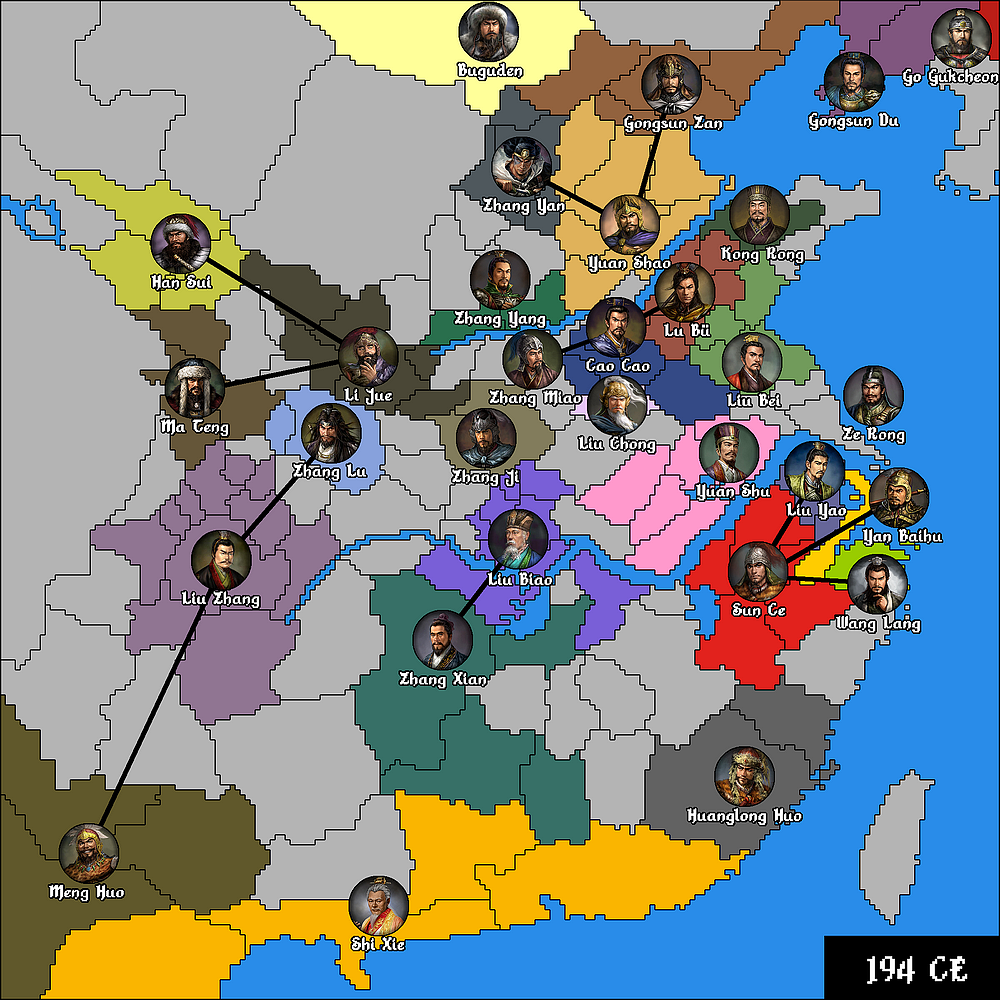
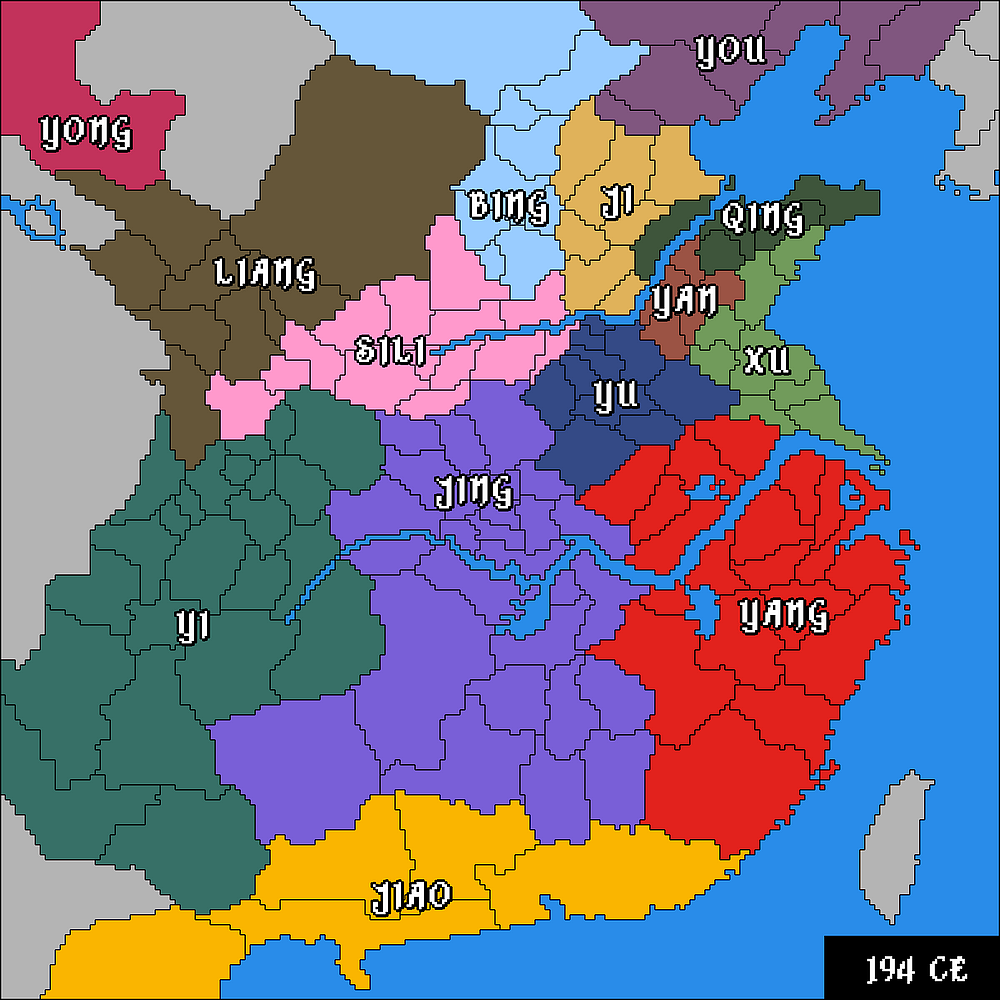
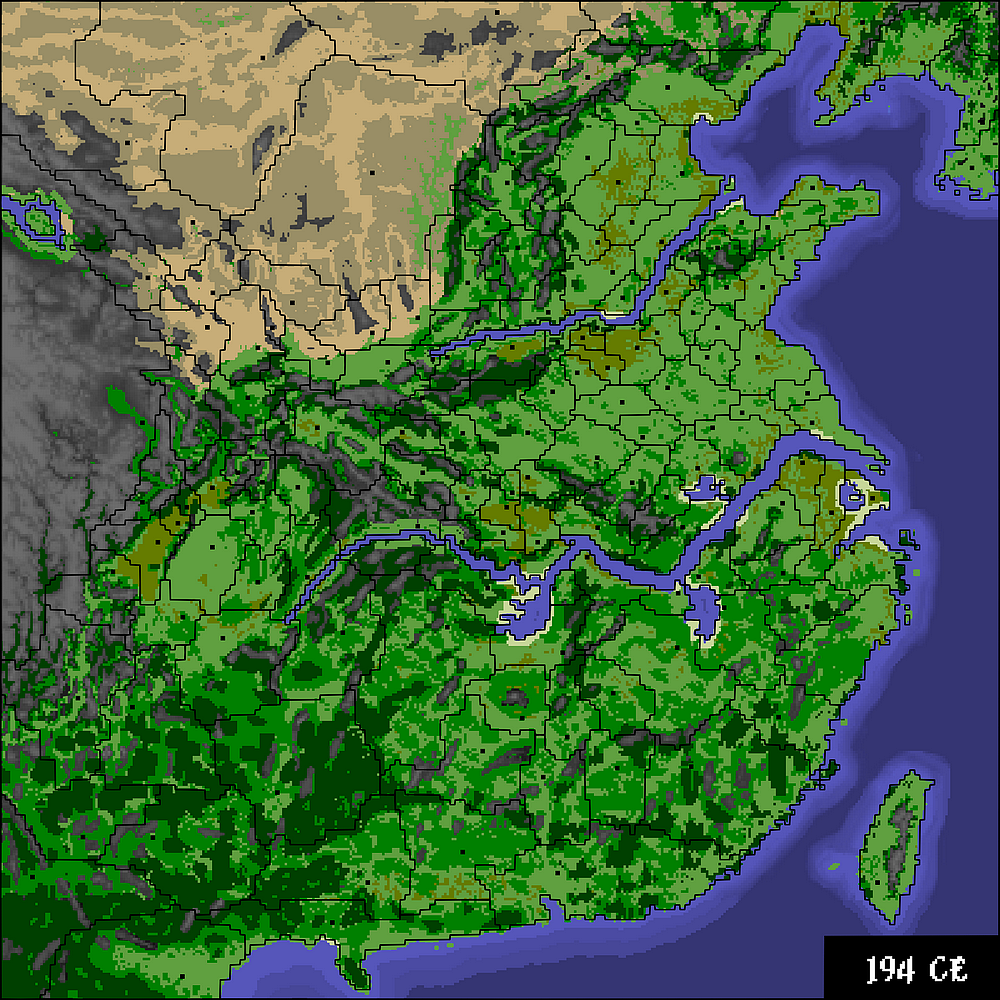

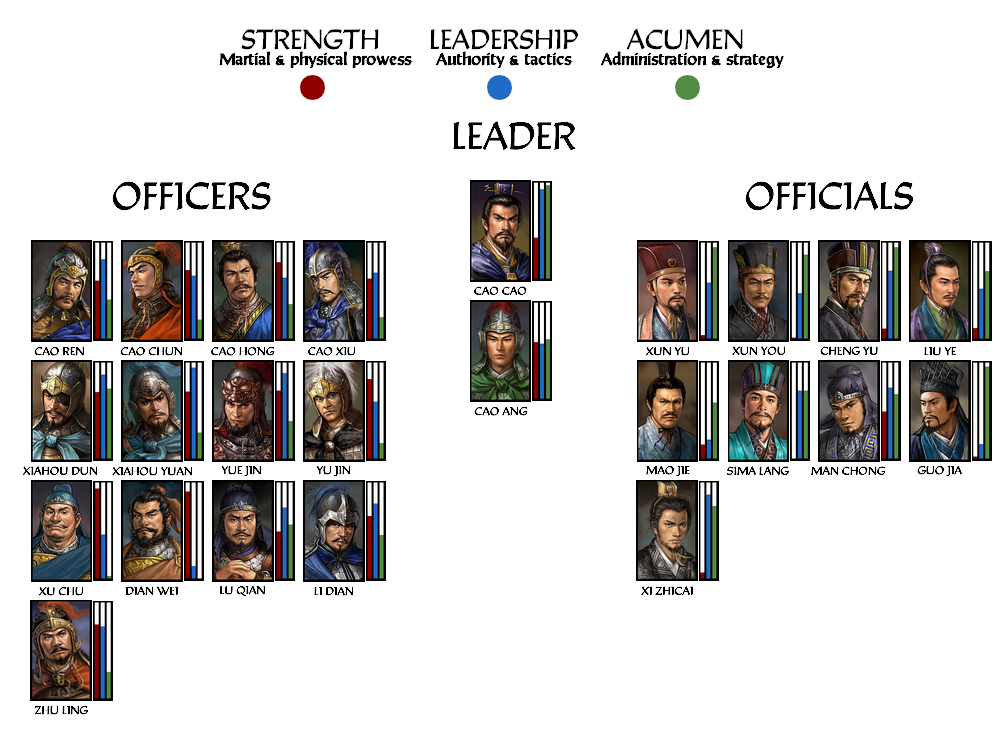




 Reply With Quote
Reply With Quote

































